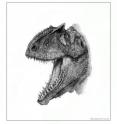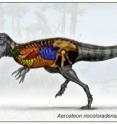New meat-eating dinosaur from Argentina had bird-like breathing system
Related images
(click to enlarge)
The remains of a new 10-meter-long predatory dinosaur discovered along the banks of Argentina's Rio Colorado is helping to unravel how birds evolved their unusual breathing system. Paleontologists led by the University of Chicago's Paul Sereno, a National Geographic Explorer-in-Residence, will publish their discovery Sept. 29 in the online journal Public Library of Science ONE. Joining Sereno to announce the discovery at a news conference in Mendoza, Argentina, today were Ricardo Martinez and Oscar Alcober, both of the Universidad Nacional de San Juan, Argentina.
The discovery of this dinosaur builds on decades of paleontological research indicating that birds evolved from dinosaurs.
"Among land animals, birds have a unique way of breathing. The lungs actually don't expand," Sereno said. Instead, birds have developed a system of bellows, or air sacs, which help pump air through the lungs. It's the reason birds can fly higher and faster than bats, which, like all mammals, expand their lungs in a less efficient breathing process.
Discovered by Sereno and his colleagues in 1996, the new dinosaur is named Aerosteon riocoloradensis ("air bones from the Rio Colorado"). "Aerosteon, found in rocks dating to the Cretaceous period about 85 million years old, represents a lineage surviving in isolation in South America. Its closest cousin in North American, Allosaurus, had gone extinct millions of years earlier and was replaced by tyrannosaurs."
Laboratory technicians spent years cleaning and CT-scanning the bones, which were embedded in hard rock, to finally reveal the evidence of air sacs within Aerosteon's body cavity. Previously, paleontologists had found only tantalizing evidence in the backbone, outside the cavity with the lungs. "This dinosaur, unlike any other, provides more direct evidence of the bellows involved in bird breathing," Martinez said. Its bones have telltale pockets and a sponge-like texture called "pneumatization," in which air sacs from the lung invade bone. Air-filled bones are the hallmark of the bellows system of breathing in birds.
Alcober noted, "Despite its huge body size and lack of a breastbone or birdlike ribcage, this meat-eater had lungs that already functioned quite a bit like a bird's."
Aerosteon provided the evidence needed to seal the connection with birds — hollow bones in front and behind the ribcage, such as the wishbone (furcula) and the main hip bone (ilium).
Said co-author of the PLoS ONE article Jeffrey Wilson of the University of Michigan, "The ancient history of features like air sacs is full of surprising turns, the explanations for which must account for their presence in a huge predator like Aerosteon as well as in a chicken."
Sereno further noted that Aerosteon has air sacs in an unusual place. "They come around the edge of the body and go into belly ribs. It looks like the beast had a system of air tubes under its skin," he said.
The team highlighted three explanations for the evolution of air sacs in dinosaurs in their paper: development of a more efficient lung; reduction of upper body mass in tipsy two-legged runners; and release of excess body heat.
Sereno is especially intrigued by heat loss, given that Aerosteon was likely a high-energy predator with feathers but without sweat glands as in birds. At approximately 30 feet in length and weighing as much as an elephant, Aerosteon might well have used an air system under the skin to rid itself of unwanted heat.
Source: University of Chicago
Articles on the same topic
- Meat-eating dinosaur from Argentina had bird-like breathing systemMon, 29 Sep 2008, 21:35:58 UTC
Other sources
- Dinosaurs had bird-like breathing systemfrom UPIThu, 2 Oct 2008, 20:14:07 UTC
- New meat-eating dinosaur from Argentina had bird-like breathing systemfrom Biology News NetThu, 2 Oct 2008, 14:14:24 UTC
- Dinosaur breathed like a modern birdfrom Reuters:ScienceWed, 1 Oct 2008, 1:14:12 UTC
- Dinosaur fossils may provide evolutionary link to modern birdsfrom The Guardian - ScienceTue, 30 Sep 2008, 16:07:07 UTC
- New meat-eating dinosaur from Argentina had bird-like breathing systemfrom Biology News NetTue, 30 Sep 2008, 15:14:13 UTC
- Meat-eating dinosaur from Argentina had bird-like breathing systemfrom Science BlogTue, 30 Sep 2008, 4:21:11 UTC
- Meat-eating Dinosaur From Argentina Had Bird-like Breathing Systemfrom Science DailyTue, 30 Sep 2008, 3:21:14 UTC
- Dinosaur predator breathed like a modern birdfrom Reuters:ScienceTue, 30 Sep 2008, 2:35:08 UTC
- Dinosaur predator breathed like a modern birdfrom MSNBC: ScienceTue, 30 Sep 2008, 0:42:20 UTC
- PHOTOS: Meat-Eating Dino Had Birdlike Breathing Systemfrom National GeographicTue, 30 Sep 2008, 0:14:10 UTC
- New Birdlike Dinosaur Found in Argentinafrom National GeographicTue, 30 Sep 2008, 0:14:05 UTC
- Meat-eating dinosaur from Argentina had bird-like breathing systemfrom Science BlogMon, 29 Sep 2008, 23:28:09 UTC
- Meat-Eating Dinosaur from Argentina Had Bird-Like Breathing Systemfrom Newswise - ScinewsMon, 29 Sep 2008, 23:21:07 UTC
- New Argentine Dinosaur Had Bird-like Breathing Systemfrom Newswise - ScinewsMon, 29 Sep 2008, 23:21:05 UTC
- Dinosaur predator breathed like a modern birdfrom Reuters:ScienceMon, 29 Sep 2008, 23:14:08 UTC
- Meat-eating dinosaur from Argentina had bird-like breathing systemfrom PhysorgMon, 29 Sep 2008, 21:28:11 UTC

